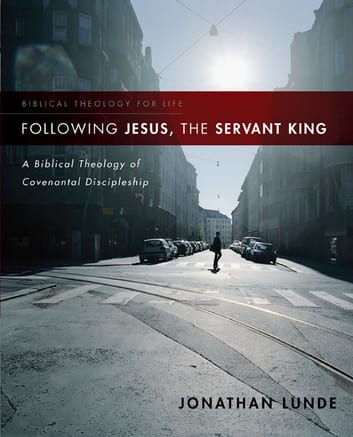“Why should I been concerned to obey all of Jesus’ commands if I have been saved by grace?” Jonathan Lunde deserves merit for clearly putting into words a frequent matter of concern for (especially young) Christians, yet one that they generally do not dare to make explicit, in Following Jesus, the Servant King: A Biblical Theology of Covenantal Discipleship. How to understand that we are freed from our sins on the account of our faith, regardless of our works, and at the same time are still supposed to behave according to moral instructions? Emphasizing either aspect to the detriment of the other has not only led some to the two opposite excesses of total license or strict legalism; albeit less spectacularly, it has also led many Christians to simply underestimate the gravity of the sins committed after their conversion, or to battle with guilt because we are not perfect yet. This is especially difficult when we read the Gospels and learn that Jesus himself gave many instructions.
Jonathan Lunde, associate professor of biblical and theological studies at Talbot School of Theology of Biola University, provides a fresh and original approach to this problem in a contribution to “Biblical Theology for Life,” a new series for Zondervan he is directing. Interestingly, a comparable concern has been recently tackled by N. T. Wright in After You Believe: Why Christian Character Matters (New York: HarperOne, 2010), where he insists on the importance of being conscious of our eschatological destiny. Since we are promised such a glorious future, and since the new creation has already begun, we should behave in accordance with our call. The contrary would be illogical. While Wright seeks a motivation to care for our present behavior in the future, Lunde finds reasons for it in the past. Through the biblical theology of covenants, he sets the problem in a wider context which proves to be illuminating.
The bulk of the book answers three questions:
1. Why should I been concerned to obey all of Jesus’ commands if I have been saved by grace?
2. What does Jesus command us to do?
3. How can we obey Jesus’ high demand?
First, Lunde tackles the covenants of the Old Testament (Edenic, Noahic, Abrahamic, Mosaic, Davidic) and their fulfillment in the New Testament. Lunde distinguishes between “grant covenants,” whose benefits are promised regardless of the obedience to their possible demands (e.g., the Noahic covenant), and “conditional covenants,” for which the promises depend on meeting the demands (e.g., the Mosaic covenant). However, he shows that even the “conditional covenants” are grounded in God’s grace. More remarkably, he establishes that even in the “grant covenants” there is an implicit expectation of obedience to demands of righteousness, as the proper response to the grace that provided the benefits of the covenants. Lunde also explains in detail how the new covenant fulfills the previous ones, and more precisely how it stems from an internalization of the demands of the Mosaic one, that itself superseded the previous covenants. Furthermore, he explains how Jesus himself fulfilled all the demands of the covenants. Against this background, several aspects of the new covenant appear in a new light:
1. The new covenant is a grant covenant. This is why Paul can insist on the salvation by faith, irrespective of our works.
2. Nevertheless, as all the previous grant covenants, the new covenant includes demands of righteousness, not as a prior condition, but as an appropriate response to the grace, which should arise naturally since they are henceforth internalized. Therefore, Jesus’ commands are not an artificial new set of commands to obey that would be superimposed on a grace framework. On the contrary, they are an integral part of Jesus’ covenant and the result of its very nature.
3. Moreover, Jesus does fulfill his own commands. Therefore, the latter “come to his disciples already as fulfilled commands” (106). Lunde insists on the double fact that Jesus is both the Servant who has met all the requirements that the humans could not fulfill and the Messiah King who has all power to decree his demands.
At this point, the systemic logic of the new covenant as a fulfillment of the others becomes apparent, but more explanations are needed as to what obeying Jesus concretely means, especially in relation to the commandments of the Mosaic covenant. This is what Lunde explains in the answering the second question (“What?”), having recourse to several metaphors:
1. Like a “filter,” Jesus’ fulfillment logically eliminates aspects of the Mosaic covenant that are simply made obsolete by the very fulfillment of the previous covenants in Jesus’ work. For example, the sacrifices cease since he has provided the ultimate sacrifice, and the food laws are irrelevant in an internalized covenant.
2. Like a “lens,” Jesus’ demands throw light on old commandments by revealing their profound meaning. For example, Jesus’ contested behavior during the Sabbath is not a violation of it but stems from a good understanding of it. The Sabbath celebrates not only the fact that God has created a well-ordered, functioning world, but also the truth of God’s sustaining care. As a result, it is not only permitted to heal somebody during a Sabbath, it is appropriate because it is in keeping with the second aspect of that feast.
3. Like a “prism,” which refracts the light in a slightly different direction, Jesus occasionally heightens the demands of some commands, thus pointing out their ultimate intentions. For instance, he elevates the adultery prohibition (Matt. 5:27–30) in extending its relevance to the mind.
Then Lunde presents “Jesus’ Kingly Summons to the Mission,” placing the sending of the disciples into the mission field against the background of the covenantal expectations in the Old Testament.
In order to answer the third question (“How?”), Lunde focuses on what discipleship practically means. To that purpose, he notably reviews several aspects of Christ’s work, presenting the Servant as the Representative, the Redeemer, the Restorer, and the Reigning King. The basic idea is that “learning to remember and receive the multifaceted grace that comes through Jesus in his different roles is, therefore, the means to living faithfully in this New Covenant era” (273).
Finally, a short chapter addresses the relevance of the subject for today, in particular regarding Christianity in the United States but also relevant for other countries, with practical considerations useful for shaping our faith and evangelistic efforts according to the biblical depiction of discipleship.
Clear, Practical, Profound
This book has many strengths and is to be commended for several complementary reasons. Lunde should be praised for his way of exposing notoriously difficult matters, like the relationship between the covenants, in a clear manner, with practical tables, diagrams, and metaphors. There are many books on different aspects of biblical theology but probably few you would advise your church members to read, since these works often presuppose some theological training. But Lunde offers the church a book readable by every motivated Christian, not only students and pastors. He patiently situates the biblical concepts he mentions, explains the context, announces what he plans to establish, offers summaries, and is always easy to follow. Such clarity is certainly the fruit of a lot of work. With such a volume, which follows a enjoyable book on mission by Chris Wright (reviewed here), and considering that Lunde is himself the editor for the series, Biblical Theology for Life proves to be very promising, perhaps being for biblical theology what “The Bible Speaks Today” is for biblical commentaries.

Following Jesus, the Servant King: A Biblical Theology of Covenantal Discipleship
Jonathan Lunde
Following Jesus, the Servant King: A Biblical Theology of Covenantal Discipleship
Jonathan Lunde
Throughout the Old Testament and into the New, God not only demands righteousness from his people but also showers on grace that enables them to act. Jesus, of course, provides the ultimate fulfillment of these twin aspects of God’s relationship to humanity. So what does it mean to follow Jesus? What does God expect from his followers, and how can they be and do what is required? Jonathan Lunde answers these and other questions in his sweeping biblical study on discipleship.
Yet clarity does not always mean profundity, and it is remarkable that this book provides at the same time an engaging piece of biblical theology. The most striking feature of the book is its great explanatory power, making sense of multiple aspects of the plan of God that are often not thought of as being related, and are sometimes even opposed. In my view, Lunde has achieved success in his initial objective to shed light on questions related to the core of Christian life by approaching them through biblical covenantal theology, which is a relatively rare and yet absolutely justified strategy. Trained readers will perhaps not find new insights at every page, which is normal, although they will certainly benefit from such a book. But there is little doubt that it would be a great delight to lay people to discover through this book the coherence of God’s design behind the successive covenants, and above all to understand how all of this renders logical, appropriate, and even natural various aspects of the new covenant in which they stand.
Moreover, in keeping with the title of the series, this book is well suited to affect the lives of the readers. It will help them to consider the demands of the new covenant (Jesus’ commands, parenetic sections in Paul’s letters, and so on) not as a new system of commandments imposed over a grace system but as the normal expression of their new being in Christ. Whereas we have a tendency to neglect these instructions and unconsciously consider them as almost optional since we live under God’s grace, it is useful to realize that they are simply a logical expression of the behavior appropriate to our new identity in Christ. As Lunde himself puts it:
Even though Jesus is the representative covenant member who fulfills this demand [of righteousness] in his own life and offers its righteous benefits to us by faith, the expectation of righteousness from us, the people of the New Covenant, is absolute. Since we have received final atonement for our sin, since we have experienced the internalization of the law, since we have a righteous king reigning over us, and since we have been graced with the internal witness and enablement of the Spirit, our righteousness ought to shine forth like the sun and draw the nations to Yahweh. (272)
In this regard, it is remarkable how Lunde and Wright’s different perspective lead them to complementary conclusions: The key is our renewed existence in the new creation, admirably prepared by the system of covenants.
Readers will also get a better vision of Christ as the Servant fulfilling the demands of God’s righteousness, and as the King they follow and who has every right to give them instructions. Lunde’s insistence about our urgent need to underline the latter aspect of Christ’s sovereignty is profoundly right and should pervade our preaching and teaching. I would even say that the final chapter, pointing to “applications,” does not summarize all the richness of the book, and that I was edified far before I was even halfway through!
Local Debates
While being globally laudatory, several of Lunde’s conclusions are debatable. Not everybody will find useful or even justified the distinction between “grant” and “conditional” covenants, which are not explicit biblical categories, nor acceptable to distinguish between two Abrahamic covenants in relation to Genesis 15 and 17. At the same time, Lunde does not really deal with the two covenants that Paul discerns in relation with Sarah and Hagar (Gal 4). Furthermore, scholars will find the way Lunde presents the passage from the commandments of the Mosaic covenant to the demands of the new covenant, by means of several metaphors (the “filter,” the “lens,” and the “prism”), too simplistic or even inadequate. Yet these images probably illustrate some effects of the passage rather than the fundamental changes at the theological level, and they are probably not intended for anything else. Furthermore, whatever one thinks on these subjects, it seems to me that Lunde conveniently points out, for example, the grounding in God’s grace of all the covenants, as well as the relevance of an obedient response to this grace, so that his main points are well established. This book is certainly not the definitive word on the biblical theology of the covenants, and it is not intended to be that, but its contents and choices are well suited to its initial, practical purpose.
That being said, although this book is explicitly a work on biblical theology and not systematic theology, trained readers, especially Reformed ones, will probably not resist reflecting on the discussions about the covenants in the light of the wider framework of the covenants of grace and of works. This is not a shortcoming of the book, but rather an occasion for further thinking, and it would be particularly interesting to the extent that this work highlights in every covenant the relevance of both grace and obedience. The latter aspect has been addressed by Henri Blocher, and the complexity in the biblical data has led him to propose a revised model of the Reformed covenant theology, finding precedents in several insights of Reformed theologians like Charles Hodge (“Old Covenant, New Covenant”, in A. T. B. McGowan [ed.], Always Reforming: Explorations in Systematic Theology [Leicester: Apollos, 2006], 240–70). I refer the reader to this subtle essay for more details on this topic, being content to say that the complexity appearing in the biblical theology of covenants, of which he will have a glimpse in Lunde’s book, might well find there their proper solution.
In sum, Lunde provides here a useful tool for the church, which, if the limits it assigns to itself are correctly understood, will certainly achieve its goal, namely to illuminate the Christian life thanks to a clear, well-written and readable biblical study of the covenants. I am looking forward to the next contribution to this promising series.
































